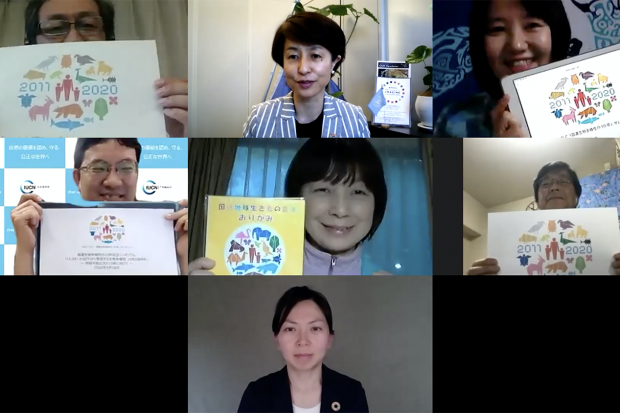On 16 May 2020, the United Nations University Institute for the Advanced Study of Sustainability, Ishikawa/Kanazawa Operating Unit (UNU-IAS OUIK) held an online symposium to commemorate the UN Decade on Biodiversity, Ishikawa, Kanazawa: 10 Years of Initiatives and the Next 10 Years on Sustainable Biodiversity. Approximately 280 people participated in the event and had an opportunity to brainstorm ideas relating to biodiversity conservation and sustainable societies for the next 10 years.
In the keynote speech, Institute for Global Environmental Strategies (IGES) President and Senior Visiting Professor of UNU Kazuhiko Takeuchi reviewed the activities of the UN Decade on Biodiversity based on the report published by the Intergovernmental Science-Policy Platform on Biodiversity and Ecosystem Services (IPBES) and spoke about the necessity for “Transformative Change” to achieve global initiatives, such as the Aichi Targets and SDGs.
UNU-IAS OUIK Research Associate Sayako Koyama introduced an activity called Notojima Shizen no Sato Nagasaki in the Nagasaki area of Noto-jima, Ishikawa Prefecture, as a concrete example of local conservation of biodiversity. She mentioned that community-based efforts are essential to continue research, protection and monitoring of an environment in which all life can grow.
Kaori Fujita, Nikkei Environment Social Governance (ESG) Senior Editor and Nikkei ESG Management Forum Producer spoke about the outlook from the business sector including recent trends in ESG investment and initiatives by major companies and local business owners.
The panel session ‘Looking Back on the Past 10 Years and Talking about the Next 10 Years’ was moderated by UNU-IAS OUIK Director Tsunao Watanabe, who was joined by Japan committee for International Union for Conservation of Nature (IUCN-J) Director General Teppei Michie, Director General of the Nature Conservation Bureau, Ministry of the Environment, Japan, Toshio Torii and UNU-IAS OUIK Researcher Evonne Yiu. Each panelist provided insights on the future direction from the viewpoint of citizen groups, society, national policy and planning, and international organisations.
Final discussions concluded that it is essential to promote multi-sectoral and interdisciplinary collaboration and cooperation to encourage knowledge and information sharing. The panelists hoped that more people would understand the multifaceted value of biodiversity and identify potential solutions. Furthermore, the current situation related to COVID-19 was explored as a catalyst for transformative change.
Here is the statement by Acting Executive Secretary of the Convention Biological Diversity Elizabeth Maruma Mrema for International Day for Biological Diversity -22 May




